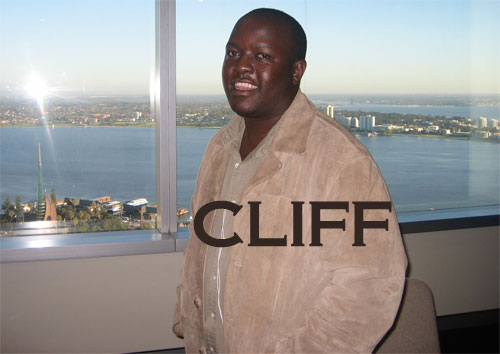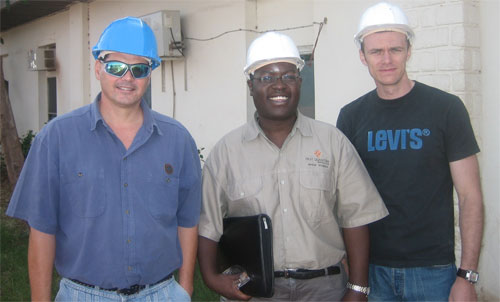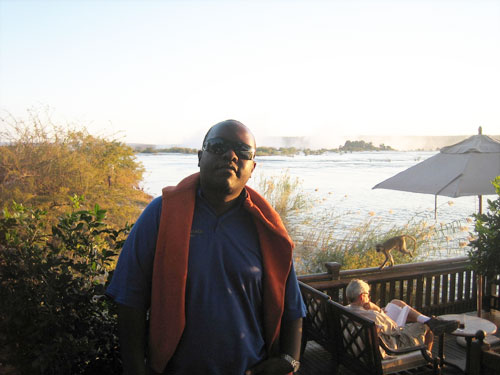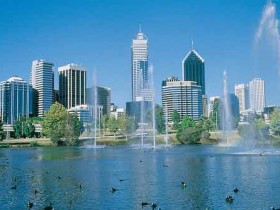
How does a party animal scoop academic excellence awards with ease, whilst his party friends languish in bed with a hangover made in hell? Meet Cliff Otega. A man with a beautiful, razor sharp mind, taste buds for the good life and an unwavering quest for success.
Kip: Why did you choose to study in Perth (Australia) as opposed to UK or US which were more popular destinations for Kenyan students in the late 1990s?
Cliff: Prior to moving to Australia, I was studying Civil Engineering at the University of Nairobi. After yet another unplanned university closure, I decided that I had had enough of that drama and began to explore my options.
A couple of my friends had left for Australia a few months earlier and suggested that I get in touch with Mahul Shah, who was at the time the premier agent for those wishing to study in Perth.
I met Mahul in Parklands at the Mayfair Hotel (now Southern Sun) and the rest is history. The final decision was based on affordability and a much more straightforward visa and relocation process than both the US and the UK.
Kip: Its good that you mention Mahul Shah, he has been responsible for helping thousands of Kenyan students further their education in Australia. How did the pre-departure parties that he used to organize in Nairobi for departing students influence your early days in Australia?
Cliff: That’s seems like a century ago. Looking back though, it was a really great way to get a sense of what you were getting into. We received a lot of information about Australia and I met a number of very interesting characters.
I’m happy that many of the fellow students I met at those parties became very good friends of mine during the early years in Perth and I am still in touch with a few people.
Kip: What, why and where did you study?
Cliff: My first institution was the famous or infamous (depending on where you ended up after) Alexander College of Technology in the Perth CBD. I received a Diploma of Business there in 1999.
I then moved to Murdoch University, situated on a very beautiful campus south of Perth City. I graduated from Murdoch in 2002 with a Bachelor of Science in Business Information Systems with a minor in Marketing. A few years later I enrolled at the University of Western Australia where I completed a Master of Commerce degree in 2005.
My initial choice of study was influenced by a keen awareness of how technology was reshaping the world as we knew it. In the late 1990’s the Internet was becoming widespread (remember this was pre-Google, Facebook, Twitter etc) and its potential was obvious. Sending an e-mail was a big deal – we were still sending aerogrammes to our families in Kenya!
I just knew that technology was the future and I guess I was proved right by the technology explosion in the 21st century. Having said that, I could have studied any subject because the true value of a university education is in teaching you to think and analyse situations rather than mastering a series of textbooks and lectures.
Kip: You are famed to have done very well in your studies. What were your key academic achievements? How can others walk in your shoes?
Cliff: Each of my three graduations (Alexander, Murdoch & UWA) were particularly satisfying as it was not by any means guaranteed, given the pressure of being a foreign student. I’m proud to say that although we partied hard, I also worked hard – never failed an exam and never had to repeat anything – and it was smooth sailing academically.
The highlight was achieving the 2002 Vice-Chancellor’s Award for Academic Excellence at Murdoch University.
One of my first teachers at Strathmore School in Nairobi taught us the importance of managing time – particularly study timetables. It was a lesson I have carried with me since then and really helped me maximize my study time to achieve great results.
I also believe in the right study environment and was a big fan of university libraries and the Perth City library. The quality of the Australian education process and the dedication and support of various professors and tutors were also instrumental. It goes without saying that the financial and moral support of my family was essential in achieving my academic goals.
Kip: You were lucky to have family in the form of a brother in Australia. How did that impact your stay here?
Cliff: Family is everything. As a teenager or young adult you tend to want to chart your own course and may neglect family relationships but over time you realise that the people that love and accept you unconditionally are your family and they are your last refuge.
My time in Australia would have been much harder had my brother Ronnie and I not been in Perth together. Having family close by gives you confidence and connection to your roots.
Kip: What kind of extracurricular activities did you participate in while in Australia?
Cliff: Hmmm…interesting question. Do you classify Northbridge nightclubs as an extra-curricular activity? I’m a very social person, so I was a permanent feature at the various get-togethers both at University and with family and friends.
I am also a keen sports fan and managed to attend a number of Aussie Rules and rugby games at Subiaco Oval. I also enjoyed travelling and visited different places both in Western Australia and Australia’s East Coast.
I was also a founder member of the Kenyan Western Australia Students Association (KWASA) organisation in 1999 which while short-lived, was the precursor of the current Kenyan and African organisations in Western Australia.
Kip: What kind of jobs did you do as an international student in Australia? What were the key lessons?
Cliff: Hahaha…I did everything! My first job was working as a pizza delivery driver for Domino’s Pizza. That only lasted a couple of months. During my student days I had a series of odd jobs – the usual fare for students – some were better than others.
The key lesson reinforced the cliché that money doesn’t grow on trees – you have to work hard to make it. Working part-time as a student also enforced the disciplines of time management, commitment and financial prudence.
I was perhaps luckier than most as I had previously worked after high school in Kenya at an engineering firm and already knew how to balance competing priorities.
Kip: With your odd job days behind you, how and where are you flying the Kenyan Flag now (work-wise)?
Cliff: I work as the global Internal Audit Manager for a Canadian mining company. I am based in Zambia. The company has offices, operations and projects in Australia, Canada, DRC, Finland, Mauritania, Peru, South Africa, United Kingdom and Zambia so I have flown many thousands of miles over the past six years.
I started my career in information technology then became an IT auditor at KPMG in Perth. I really enjoyed audit and decided to make a career switch and become a business auditor.
Kip: Can we now call you an Australian Expatriate in Zambia?
Cliff: Yes I am working as an expatriate in Zambia. Not sure whether to classify myself as an Australian or Kenyan expatriate – I suppose I was hired in Australia…any way those are just titles.
Kip: How would you describe the impact that your expatriate job has had on your life experiences e.g. travel, family?
Cliff: I have always valued the concept of work / life balance and one of my personal philosophies is that your work should enrich your life and not rob you of the things you hold dear such as family, friends, self-development and your integrity.
My current role has allowed me to re-engage with Africa at a time when the continent is poised for perhaps its most dramatic period of positive change both socially and economically.
My proximity to Kenya means I get to visit home much more often than I would had I still been based in Australia. Having said that I obviously sacrifice a lot of personal time to satisfy the requirements of my role.
I have mentioned that I travel extensively – this is one of the things I have enjoyed the most. Experiencing different cultures opens one’s eyes to the possibilities in your own part of the world and allows for lateral thinking and has definitely made me a better informed and more tolerant individual.
Kip: We need more tolerant individuals in Kenya especially with elections around the corner. What was the effect of the 2007/8 post-election violence on you and what would your message to Kenyans be as we approach the next election cycle?
Cliff: On a personal level the post-election confidence shattered my confidence in Kenya in the medium term. I suppose having lived outside Kenya for nearly a decade at that point in time I had a romanticised view of the country and our “Kenyaness” which I think is a very common trait of the Kenyan diaspora.
The reality was that those of us fortunate enough to have grown up in Nairobi and lived overseas do not understand the dynamics of the real Kenya. The country is ethnically conflicted and there are great disparities across various classes, with the most glaring being the gap between rich and poor.
As we approach the 2013 elections we will have to accept hard truths. To paraphrase the Spanish / American philosopher George Santayana, those who do not understand history are doomed to repeat it. We need to face the demon of ethnicity head on and stop using it as the key determinant in our political contests and allocation of resources.
We need to stop blaming politicians and take individual responsibility as we are the fuel for their fire –each time we repeat a stereotypical ethnic slur or silently rejoice in an ethnic appointment we are as guilty as the guy wielding a machete (panga) in our slums and rural villages.
I pray for peace and prosperity in Kenya and I am confident that once we get over the 2013 hurdle we will be a potent force to reckon with as a country economically. I also encourage all eligible Kenyans to vote and express their choice – it’s pointless to complain about the outcome if you don’t make the effort. Those who are constrained by distance should encourage family and friends back home to vote.
Kip: You have been fortunate to have experienced life in three nations. How would you describe Kenya, Australia and Zambia? What are their similarities and differences?
Cliff: Starting with Australia – I have a lot of respect for what the country stands for and its attitude towards fairness, the rule of law and respect for the environment which is not always the case in Africa. Australia’s history is illuminating in how misfortune can be turned into great fortune. Australia’s great natural resources have been harnessed to generate a lifestyle that is the envy of much of the world. I feel that Australia needs to do more to integrate immigrants and I am confident that steps are being taken in this regard.
Zambia is also a country of great beauty and peace. I have had the pleasure of visiting the Victoria Falls in Livingstone which was fantastic. I think her best days are definitely ahead especially if her great mineral wealth is fairly exploited as Australia has done. Zambians value peaceful living and the country has good lessons for Kenya in terms of relative ethnic harmony and a fairer and more inclusive political and economic dispensation.
Kenya is always close to my heart. There is rarely a day when I do not think about Kenya. I am frustrated by the pace of change while at the same time hopeful that we are moving in the right direction. Kenyan society is generally very aggressive in a positive way and we can see that in what we have achieved in financial services, tourism, technology and agriculture as compared to say, Zambia. The country needs to guard these achievements jealously. Kenya is actually one of the most dynamic places I have ever experienced – I would compare Nairobi’s energy to New York albeit on a smaller scale.
The Australia – Africa relationship is yet to be exploited beyond the mining / oil and gas industries. I see great opportunity for Africans with an Australian connection in this relationship.
Kip: What are some of the secrets to your success?
Cliff: I am an avid consumer of all kinds of information. I go through phases and I am now in my autobiography / biography phase. I am greatly inspired by stories of those, past or present, who have blazed a trail.
We have a lot to learn from other people’s lives. From the biographies of Nobel laureates Wangari Maathai, Barack Obama and Nelson Mandela to the late Australian businessman Kerry Packer, Bob Marley, Njenga Karume, Jaramogi Oginga Odinga, Lee Kuan Yew (Singapore’s independence leader) and Roman Abramovich (Russian billionaire and Chelsea FC owner), I have gained great insights into success and failure and the divine obligation we have to pursue self-actualisation.
Kip: Finally, what are the top 5 things in your bucket list? Additional things that you want to achieve in your lifetime?
Cliff: I’m always cautious with bucket lists! I will list 5 things in no particular order: Find a God-fearing loving partner and start a family, create a foundation for Africa, visit Brazil, start my own business and own an outrageously expensive European car.
Kip: Thank you very much for your time and insights Cliff. May you achieve all that your heart desires. Your story will be an inspiration to many to rise above mediocrity and achieve more in life.
Cliff: Thank you. All the best too.


So true about the prospect of development after 2013 huddle. God be with us
This is very illuminating stuff,nice to hear my good friend doing big things,sky is indeed the limit! I can’t forget the bashes, northbridge and metro night outs we both enjoyed and the few times he dropped me diggz lol. All the best bro…….